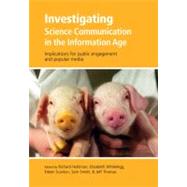Investigating Science Communication in the Information Age Implications for Public Engagement and Popular Media
, by Holliman, Richard; Whitelegg, Elizabeth; Scanlon, Eileen; Smidt, Sam; Thomas, Jeff- ISBN: 9780199552665 | 0199552665
- Cover: Paperback
- Copyright: 11/30/2008
How are recent policy changes affecting how scientists engage with the public? How are new technologies influencing how scientists disseminate their work and knowledge? How are new media platforms changing the way the public interact with scientific information? Investigating Science Communication in the Information Age is a collection of newly-commissioned chapters by leading science communication scholars. It addresses current theoretical, practical and policy developments in science communication, including recent calls for greater openness and transparency; and engagement and dialogue on the part of professional scientists with members of the public. It provides a timely and wide-ranging review of contemporary issues in science communication, focusing on two broad themes. The first theme critically reviews the recent dialogic turn and ascendant branding of 'public engagement with science'. It addresses contemporary theoretical and conceptual issues facing science communication researchers, and draws on a range of methodological approaches and examples. The second theme, popular media, examines recent trends in the theory and research of these forms of science communication. It includes contemporary accounts of the study of 'traditional' forms of popular media, including television and newspapers, examining how they are produced, represented and consumed. This theme also documents examples where novel forms of popular media are challenging researchers to re-think how they approach these forms of science communication. A companion volume, Practising Science Communication in the Information Age, provides an ideal introduction to anyone wishing to reflect on the practices of contemporary science communication.






